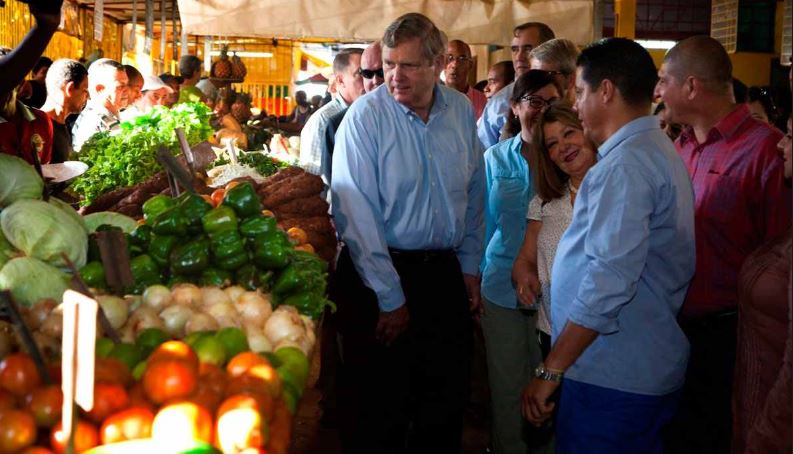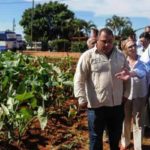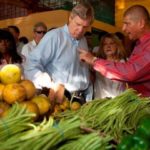
Vilsack hopes meeting will push Congress on Cuba trade deal
WASHINGTON — Agriculture Secretary Tom Vilsack said he is optimistic a visit with his Cuban counterpart Friday in Iowa can help build pressure on Congress to fully lift the embargo on trade with the communist country.
The White House announced in late 2014 efforts to improve relations with Cuba’s communist regime, including expanding trade. While President Barack Obama has eased some financial and travel restrictions and reopened the U.S. embassy in Havana, Congress has not agreed to lift the embargo.
“I think as we build those connections the political case for removal of the embargo will strengthen and eventually we’ll get to the point where there are adequate numbers in Congress to overcome the resistance to lifting the embargo,” Vilsack said Friday. “When that day comes … we’re going to see an explosion of opportunity, and we just want to make sure we are prepared with the relationships and the awareness of that Cuban market.”
In an interview ahead of the meeting with Cuban Agriculture Minister Gustavo Rodriguez Rollero, Vilsack said Iowa — the nation’s top corn, soybean, pork, egg and ethanol producer — has an “amazing diversity of opportunity” that could benefit from expanded trade. The former Iowa governor said the state’s soybean industry could be among the biggest beneficiaries of improved trade relations, along with pork and poultry.
“I want (Rollero) to know that Iowa is a place that represents a diversified agricultural economy, similar to one that he can help develop in his country,” Vilsack said.
During the Iowa visit, Vilsack and Rollero plan to visit Dupont Pioneer, an organic farm in Polk City, a seed center at Iowa State University and Lincolnway Energy in Nevada. Rollero also is scheduled to meet in Washington Thursday with Michael Scuse, USDA’s acting deputy secretary.
Iowa is unlikely to be a direct exporter of soybeans to Cuba but could still benefit from farmers in the southern United States who will experience increased demand for their crops, said Kirk Leeds, chief executive officer of the Iowa Soybean Association. As those states ship more of their product to Cuba, it will create opportunities for Iowa and other states to fill that void.
“Cuba is never going to be a huge market for the U.S. relative to other markets in the world, but in a time of overproduction and strong supplies, any and all markets are important to us,” Leeds said. “Any beans that they use from the U.S. is going to be good for Iowa farmers.”
Trade sanctions against Cuba have exempted food and agricultural exports since 2001. But rules on completing transactions — using cash isn’t an option, for example, and payments are required in advance — resulted in extra expense and time, complicating shipments of some products.
Agricultural shipments to Cuba have remained volatile the past decade, peaking at around $700 million in 2008. In 2015, shipments totaled nearly $170 million, with frozen chicken making up 46 percent of the figure, according to the U.S.-Cuba Trade and Economic Council. Herbicides, soybeans and soybean products made up an additional 46 percent.
Agricultural shipments during the first quarter of 2016 plunged 29 percent from the same time a year ago.
John Kavulich, president of the U.S.-Cuba Trade and Economic Council, said one reason for the decline is that other countries are offering better credit terms to Cuba. The country also is likely holding back on imports from the United States in order to send a message.
“Cuba feels by buying less they’ll somehow instill a crack-like response by the U.S. business community that more needs to be changed in terms of law and regulation,” Kavulich said.
Still, he wasn’t optimistic about congressional action anytime soon.
“There will be no legislation (from Congress) this year and quite likely next year,” he said.
(From The Des Moines Register)
[Photo at top: Tom Vilsack visiting a farmers’ market near Havana last November.]




